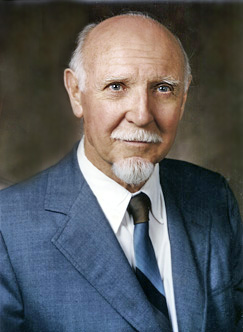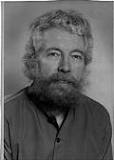Related Research Articles
Psychological statistics is application of formulas, theorems, numbers and laws to psychology. Statistical methods for psychology include development and application statistical theory and methods for modeling psychological data. These methods include psychometrics, factor analysis, experimental designs, and Bayesian statistics. The article also discusses journals in the same field.
Psychometrics is a field of study within psychology concerned with the theory and technique of measurement. Psychometrics generally covers specialized fields within psychology and education devoted to testing, measurement, assessment, and related activities. Psychometrics is concerned with the objective measurement of latent constructs that cannot be directly observed. Examples of latent constructs include intelligence, introversion, mental disorders, and educational achievement. The levels of individuals on nonobservable latent variables are inferred through mathematical modeling based on what is observed from individuals' responses to items on tests and scales.
Experimental psychology refers to work done by those who apply experimental methods to psychological study and the underlying processes. Experimental psychologists employ human participants and animal subjects to study a great many topics, including sensation, perception, memory, cognition, learning, motivation, emotion; developmental processes, social psychology, and the neural substrates of all of these.

Raymond Bernard Cattell was a British-American psychologist, known for his psychometric research into intrapersonal psychological structure. His work also explored the basic dimensions of personality and temperament, the range of cognitive abilities, the dynamic dimensions of motivation and emotion, the clinical dimensions of abnormal personality, patterns of group syntality and social behavior, applications of personality research to psychotherapy and learning theory, predictors of creativity and achievement, and many multivariate research methods including the refinement of factor analytic methods for exploring and measuring these domains. Cattell authored, co-authored, or edited almost 60 scholarly books, more than 500 research articles, and over 30 standardized psychometric tests, questionnaires, and rating scales. According to a widely cited ranking, Cattell was the 16th most eminent, 7th most cited in the scientific journal literature, and among the most productive psychologists of the 20th century. He was a controversial figure due in part to his friendships with, and intellectual respect for, white supremacists and neo-Nazis.
Mathematical psychology is an approach to psychological research that is based on mathematical modeling of perceptual, thought, cognitive and motor processes, and on the establishment of law-like rules that relate quantifiable stimulus characteristics with quantifiable behavior. The mathematical approach is used with the goal of deriving hypotheses that are more exact and thus yield stricter empirical validations. There are five major research areas in mathematical psychology: learning and memory, perception and psychophysics, choice and decision-making, language and thinking, and measurement and scaling.
Quantitative psychology is a field of scientific study that focuses on the mathematical modeling, research design and methodology, and statistical analysis of psychological processes. It includes tests and other devices for measuring cognitive abilities. Quantitative psychologists develop and analyze a wide variety of research methods, including those of psychometrics, a field concerned with the theory and technique of psychological measurement.
William Roger Revelle is a psychology professor at Northwestern University working in personality psychology. Revelle studies the biological basis of personality and motivation, psychometric theory, the structure of daily mood, and models of attention and memory.
Latent growth modeling is a statistical technique used in the structural equation modeling (SEM) framework to estimate growth trajectories. It is a longitudinal analysis technique to estimate growth over a period of time. It is widely used in the field of psychology, behavioral science, education and social science. It is also called latent growth curve analysis. The latent growth model was derived from theories of SEM. General purpose SEM software, such as OpenMx, lavaan, AMOS, Mplus, LISREL, or EQS among others may be used to estimate growth trajectories.

John Leonard Horn was a scholar, cognitive psychologist and a pioneer in developing theories of intelligence. The Cattell-Horn- Carroll (CHC) theory is the basis for many modern IQ tests. Horn's parallel analysis, a method for determining the number of factors to keep in an exploratory factor analysis, is also named after him.
The Society of Multivariate Experimental Psychology (SMEP) is a small academic organization of research psychologists who have interests in multivariate statistical models for advancing psychological knowledge. It publishes a journal, Multivariate Behavioral Research.
Elizabeth Zelinski is an American college professor known for her expertise in gerontechnology, neuroscience, and cognition. She is the Rita and Edward Polusky Chair in Education and Aging Professor of Gerontology and Psychology at the USC Davis School of Gerontology and she heads the Center for Digital Aging. Zelinski studies longitudinal changes in objective cognition and self-reported memory in healthy older adults, interventions to improve their cognition and health effects on cognition in aging.
Yuichi Shoda is a Japanese-born psychologist and academic who contributed to the development of the cognitive-affective personality system theory of personality.
Jeffrey Scott Tanaka was an American psychologist and statistician, known for his work in educational psychology, social psychology and various fields of statistics including structural equation modeling.
Kathleen Marie "Katie" Gates is an American neuroscientist, quantitative psychologist, and faculty member in the L. L. Thurstone Psychometric Laboratory at the University of North Carolina at Chapel Hill. She is known for her contributions to network analysis, time series analysis, and structural equation modeling toward the development and dissemination of methods for quantifying intra-individual change and person-specific processes as they unfold across time.
Patrick James Curran is an American psychologist and statistician. He is a professor of quantitative psychology at the University of North Carolina, where he is also a faculty member at the Center for Developmental Science.
Daniel John Bauer is an American statistician, professor, and director of the quantitative psychology program at the University of North Carolina, where he is also on the faculty at the Center for Developmental Science. He is known for rigorous methodological work on latent variable models and is a proponent of integrative data analysis, a meta-analytic technique that pools raw data across multiple independent studies.
John Richard Nesselroade is an American psychologist known for his work in developmental and quantitative psychology. He is the Hugh Scott Hamilton Professor of Psychology emeritus at the University of Virginia and an adjunct professor of human development at Pennsylvania State University. He retired from the University of Virginia in June 2011 after serving as the Hugh Scott Hamilton Professor there for twenty years. He is a fellow of the American Association for the Advancement of Science, the Gerontological Society of America, and the American Psychological Association (APA), as well as a charter fellow of the American Psychological Society. He served as president of the APA's Division 20 from 1982 to 1983, and of the Society of Multivariate Experimental Psychology from 1999 to 2000.

Ellen Louise "E.L." Hamaker is a Dutch-American psychologist, and statistician. Since 2018 she has been a full professor at Utrecht University, holding the chair Longitudinal Data Analysis at the Department of Methodology and Statistics. Her work focuses on the development of statistical models for the analysis of intensive longitudinal data in psychology, mainly within the frameworks of structural equation modeling and time series analysis.

Werner W. Wittmann is a German psychologist, evaluation researcher and research methodologist.
References
- ↑ Price, Michael (November 2009). "Mining for data gold". Monitor on Psychology. Retrieved 2018-06-09.
- 1 2 "John J. McArdle, PhD". USC Leonard Davis School of Gerontology. Retrieved 2018-06-09.
- ↑ "Dr. John J. McArdle". Society of Multivariate Experimental Psychology. Retrieved 2018-06-09.
- ↑ "John J. McArdle CV" (PDF). Retrieved 2019-10-04.